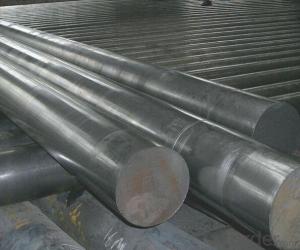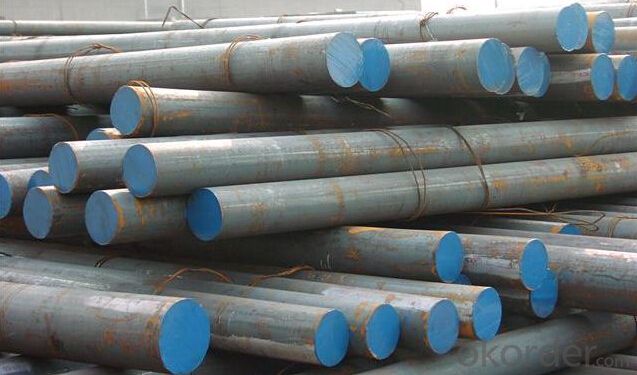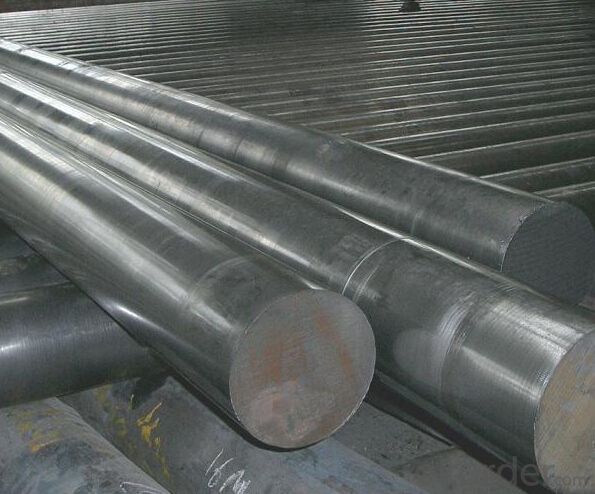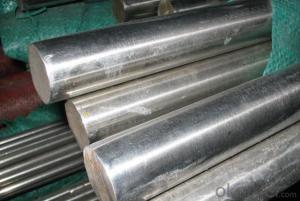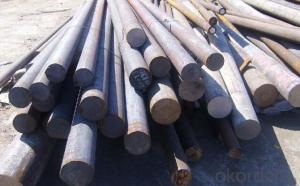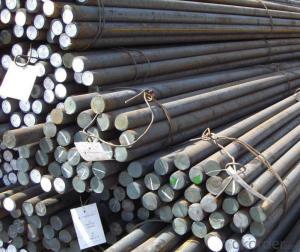Grade 40Mn CNBM Hot Rolled Alloy Steel Round Bar
- Loading Port:
- Shanghai
- Payment Terms:
- TT OR LC
- Min Order Qty:
- 20 m.t.
- Supply Capability:
- 10000 m.t./month
OKorder Service Pledge
OKorder Financial Service
You Might Also Like
Specification
Specifications:
1. Commodity: Round steel bar
2. Technical: Hot rolling
3. Length: Min. 5.8meter, according to requirement.
4.Diameter: 16mm-250mm
Material | 40Mn | Round bar | Dia(mm) | 16-600 |
Process | EAF + LF + VD + Forged + Heat Treatment (optional) | Length (mm) | Max 12000 | |
Heat treatment | Normalized / Annealed / Quenched / tempered | Flat bar | Thickness(mm) | 8-500 |
Delivery condition | Hot forged +Rough machined (black surface after Q/T)+ Turned (optional) | Width(mm) | 70-200 | |
Test | Ultrasonic test according to SEP 1921-84 D/d | Length (mm) | Max 12000 | |
Chemical Composition:
C | Si | Mn | Cr | Ni | Cu |
0.5~0.8 | 0.17~0.37 | 0.25~1.2 | ≤0.25 | ≤0.30 | ≤0.25 |
Usage and Applications:
Gear, Sleevesspool,Shaft, Crankshaft, Pin
Packaging & Delivery:
Packaging Detail: Standard seaworthy packing or as customer required; all goods are packed in bundle with steel strips and shipped by break bulk vessel or container
Delivery Detail: 15~45 days
Production Flow:
EAF+LF+VD+ Forged+ Heat Treatment
Material prepare (billet) — heat up — rough rolling — precision rolling — cooling — packing — storage and transportation
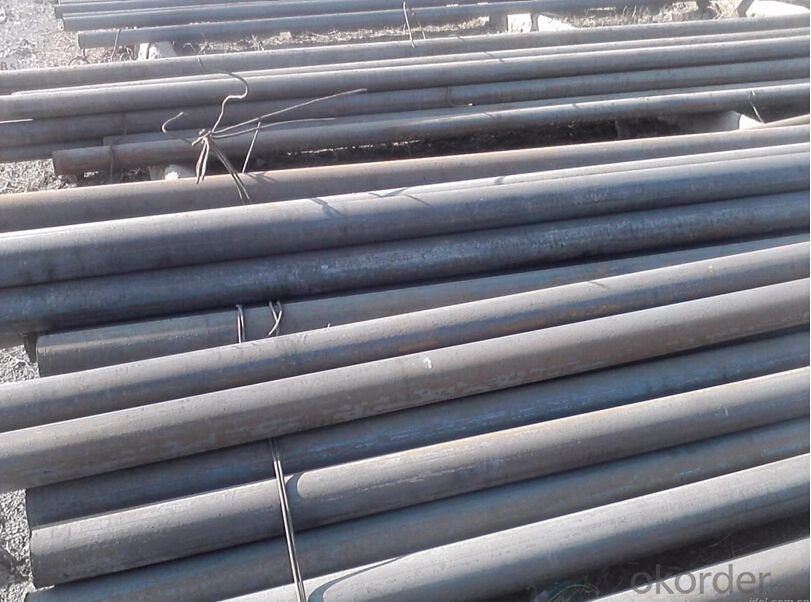
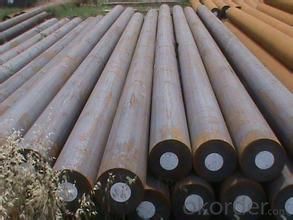
Quality Assurance:
1. We will strictly inspect our production that we sold according to the customer’s request.
2. Our steel reaches international quality standards.
3. Quality should be in conformity with the specification of the manufacturer. Quantity and packing conditions should be in conformity with the term in the contract.
4. Should the packing found damaged, the buyer has the right to claim to the seller
- Q: How does stainless steel contribute to the automotive industry?
- Stainless steel contributes to the automotive industry by providing durability, corrosion resistance, and aesthetic appeal to various parts and components. It is commonly used in exhaust systems, engine components, body panels, and trim pieces, ensuring longevity and maintaining the integrity of vehicles even in harsh conditions.
- Q: What are the different types of maraging steel?
- There are various types of maraging steel, including Maraging 200, Maraging 250, and Maraging 300.
- Q: Can special steel be used in mining applications?
- Indeed, mining applications can utilize special steel. This unique material, also known as alloy steel, features enhanced properties that include increased strength, durability, and resistance to wear and corrosion. These exceptional characteristics make it highly suitable for a wide range of mining applications that involve extreme conditions such as heavy loads, abrasive materials, and exposure to water or chemicals. In the mining industry, special steel finds common use in the manufacturing of various equipment and components. Examples include drill bits, cutting tools, crushing and grinding equipment, conveyor belts, and structural components of mining machinery. For instance, drill bits made from special steel alloys exhibit improved hardness and toughness, enabling them to effectively penetrate hard rock formations. Similarly, crushing and grinding equipment that incorporates special steel components can withstand the high stress and impact forces encountered during mineral extraction and processing. Furthermore, special steel alloys offer superior resistance to corrosion and wear, which are prevalent challenges in mining environments. This quality contributes to extending the lifespan of mining equipment, reducing maintenance costs, and enhancing operational efficiency. Additionally, manufacturers have the flexibility to tailor special steel to meet specific requirements, allowing them to optimize the performance of mining equipment for different mining applications and conditions. Overall, the utilization of special steel in mining applications provides numerous advantages in terms of enhanced performance, durability, and cost-effectiveness. Its distinct properties establish it as an indispensable material in mining operations, facilitating the extraction and processing of minerals in a more efficient and sustainable manner.
- Q: Is special steel suitable for manufacturing cutting tools?
- Yes, special steel is highly suitable for manufacturing cutting tools. Special steel refers to steel that has been specifically designed and processed to possess exceptional properties such as high hardness, toughness, and wear resistance. These characteristics make special steel an ideal choice for cutting tools as they enable the tools to withstand the high stresses and pressures involved in cutting operations. The hardness of special steel ensures that cutting tools can maintain their sharpness for a longer period of time, leading to improved cutting performance and efficiency. Additionally, the toughness of special steel allows cutting tools to resist chipping, cracking, or breaking during use, enhancing their durability and longevity. Furthermore, the wear resistance of special steel ensures that cutting tools can withstand the abrasive forces encountered during cutting operations without significant loss of material or deterioration. This helps to maintain the accuracy and precision of the cutting tools over time. Moreover, special steel can be tailored to meet specific requirements for different cutting applications. For example, high-speed steel (HSS) is a type of special steel that is particularly suitable for cutting tools used in high-speed machining operations. HSS possesses excellent heat resistance and can retain its hardness even at elevated temperatures. In conclusion, special steel is highly suitable for manufacturing cutting tools due to its hardness, toughness, wear resistance, and ability to be customized for specific cutting applications. These properties enable cutting tools to deliver optimal cutting performance, durability, and accuracy.
- Q: What are the main applications of special steel in the defense vehicles?
- Special steel is widely used in defense vehicles for its exceptional strength, durability, and resistance to extreme conditions. It is primarily utilized in the manufacturing of armored vehicles, tanks, and military aircraft, providing enhanced protection against ballistic threats and explosions. Special steel is also crucial in the production of components such as engine parts, suspension systems, and weapon systems, ensuring optimum performance, reliability, and longevity in challenging battlefield environments. Additionally, its corrosion resistance properties make it suitable for marine defense vehicles, submarines, and naval vessels, enhancing their structural integrity and operational efficiency.
- Q: How does special steel perform in high-temperature creep resistance?
- Special steel is known for its exceptional performance in high-temperature creep resistance. Creep refers to the tendency of a material to deform or strain under constant stress when exposed to elevated temperatures. In such conditions, ordinary steels may exhibit significant creep, leading to a loss of mechanical properties and potential failure. However, special steels are specifically designed to withstand high-temperature creep, making them ideal for applications where resistance to time-dependent deformation is critical. These steels are often alloyed with elements such as chromium, molybdenum, and vanadium, which enhance their high-temperature properties. The alloying elements in special steels form stable carbides and nitrides, which act as strengthening agents, inhibiting grain growth, and preventing dislocation movement. This results in improved creep resistance and structural stability even at extreme temperatures. Additionally, special steels often undergo heat treatment processes such as quenching and tempering, which further enhance their creep resistance and overall mechanical performance. Furthermore, the microstructure of special steels is carefully controlled during the manufacturing process to ensure optimal creep resistance. Fine-grained structures with a high density of precipitates or second-phase particles are typically developed, which hinder dislocation movement and improve creep strength. In summary, special steels exhibit exceptional high-temperature creep resistance due to their alloying elements, heat treatment processes, and controlled microstructures. These steels can reliably withstand prolonged exposure to elevated temperatures without significant deformation or loss of mechanical properties, making them invaluable in industries such as aerospace, power generation, and petrochemicals where high-temperature applications are common.
- Q: How does special steel contribute to weight reduction in manufacturing?
- Special steel, engineered specifically for various manufacturing applications, possesses certain characteristics that make it suitable. One major advantage of special steel is its ability to reduce weight in manufacturing processes. Industries that prioritize weight reduction, such as automotive, aerospace, and construction, often utilize special steel. This is because special steel has a high strength-to-weight ratio, meaning it can provide the necessary strength and performance while being lighter compared to other materials. Using special steel allows companies to achieve weight reduction in multiple ways. Firstly, the lightweight nature of special steel enables the production of significantly lighter components and structures compared to conventional materials. This reduction in weight offers several benefits, including improved fuel efficiency in automobiles, increased payload capacity in aircraft, and easier handling and installation in construction projects. Moreover, special steel's high strength-to-weight ratio allows manufacturers to design and produce thinner yet equally strong components. This not only reduces overall weight but also optimizes material usage, leading to cost savings and a more sustainable manufacturing process. Additionally, special steel's unique properties, such as excellent formability and weldability, facilitate the creation of complex and intricate designs that further contribute to weight reduction. This versatility enables the production of lightweight components with intricate shapes and structures, enhancing overall performance and functionality. In conclusion, special steel is crucial in reducing weight during manufacturing processes. Its high strength-to-weight ratio, lightweight nature, excellent formability, and weldability enable the production of lighter components and structures. By utilizing special steel, industries can achieve improved efficiency, performance, and sustainability in their manufacturing operations.
- Q: What are the applications of special steel in the manufacturing supply chain?
- Special steel has various applications in the manufacturing supply chain. It is commonly used in industries such as automotive, aerospace, energy, and construction. Special steel's unique properties, including high strength, durability, and resistance to corrosion and wear, make it ideal for manufacturing components and parts that require exceptional performance under demanding conditions. These applications can range from manufacturing engine components, structural parts, tools, and machinery, to oil and gas pipelines, power generation equipment, and building infrastructure. Special steel plays a crucial role in enhancing the overall efficiency, reliability, and safety of the manufacturing supply chain.
- Q: How does special steel contribute to the renewable energy storage?
- Special steel plays a crucial role in renewable energy storage by enabling the construction of durable and efficient energy storage systems. It is used in the manufacturing of batteries, fuel cells, and other components, providing strength, corrosion resistance, and thermal stability. The high-quality properties of special steel help enhance the performance and longevity of renewable energy storage technologies, ensuring their reliability and contributing to the overall sustainability and viability of the renewable energy sector.
- Q: How does special steel contribute to the medical field?
- Special steel plays a crucial role in the medical field by offering unique properties and characteristics that are essential for various medical applications. Firstly, special steel is widely used in the production of surgical instruments and medical devices due to its exceptional strength, durability, and corrosion resistance. These qualities ensure that the instruments can withstand the demanding environment of surgical procedures, remain sharp for extended periods, and resist the effects of sterilization processes. Additionally, special steel is utilized in the manufacturing of implants and prosthetics. Its biocompatibility and high strength-to-weight ratio make it an ideal material for creating artificial joints, spinal implants, and dental implants. Special steel's ability to integrate with the human body without causing adverse reactions or rejection is crucial for the success of these medical interventions. Moreover, special steel is employed in the production of medical equipment such as MRI machines, X-ray machines, and radiation shields. The unique magnetic properties of certain types of special steel enable the creation of powerful magnets used in MRI machines, allowing for detailed and accurate imaging of the human body. Furthermore, special steel's ability to shield against radiation makes it an essential component in radiation therapy equipment, protecting healthcare professionals and patients from harmful radiation exposure. In summary, special steel is a critical material in the medical field due to its strength, durability, corrosion resistance, biocompatibility, and unique magnetic properties. Its applications range from surgical instruments and medical devices to implants, prosthetics, and medical equipment. The contributions of special steel in the medical field are indispensable, ensuring the safety, effectiveness, and success of various medical procedures and treatments.
Send your message to us
Grade 40Mn CNBM Hot Rolled Alloy Steel Round Bar
- Loading Port:
- Shanghai
- Payment Terms:
- TT OR LC
- Min Order Qty:
- 20 m.t.
- Supply Capability:
- 10000 m.t./month
OKorder Service Pledge
OKorder Financial Service
Similar products
Hot products
Hot Searches
Related keywords

